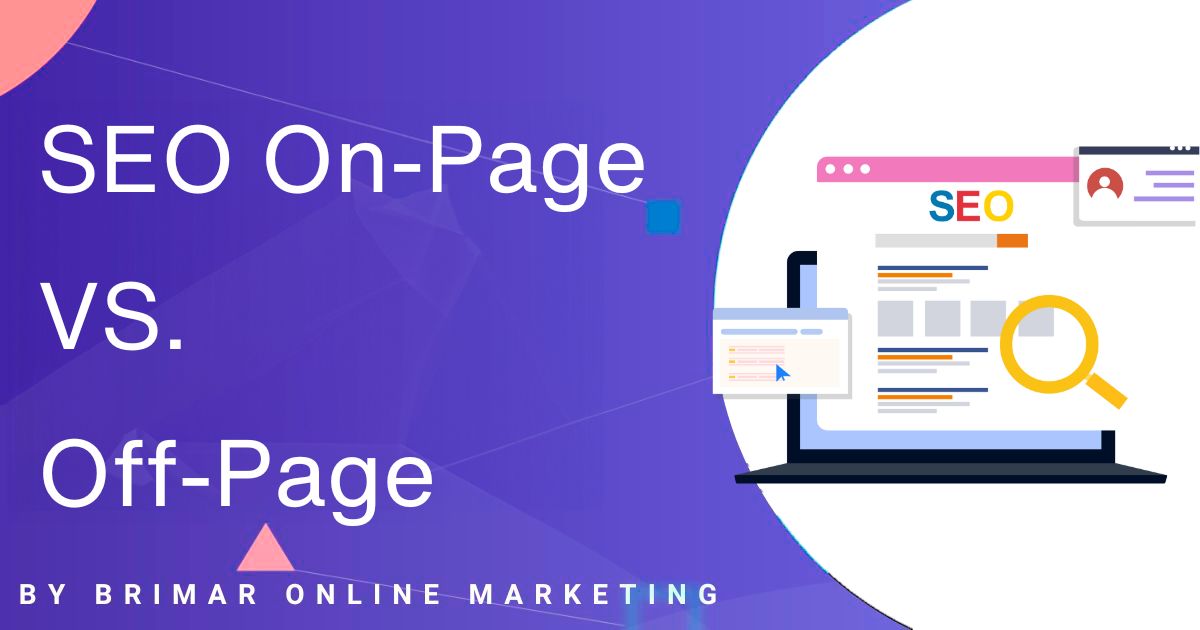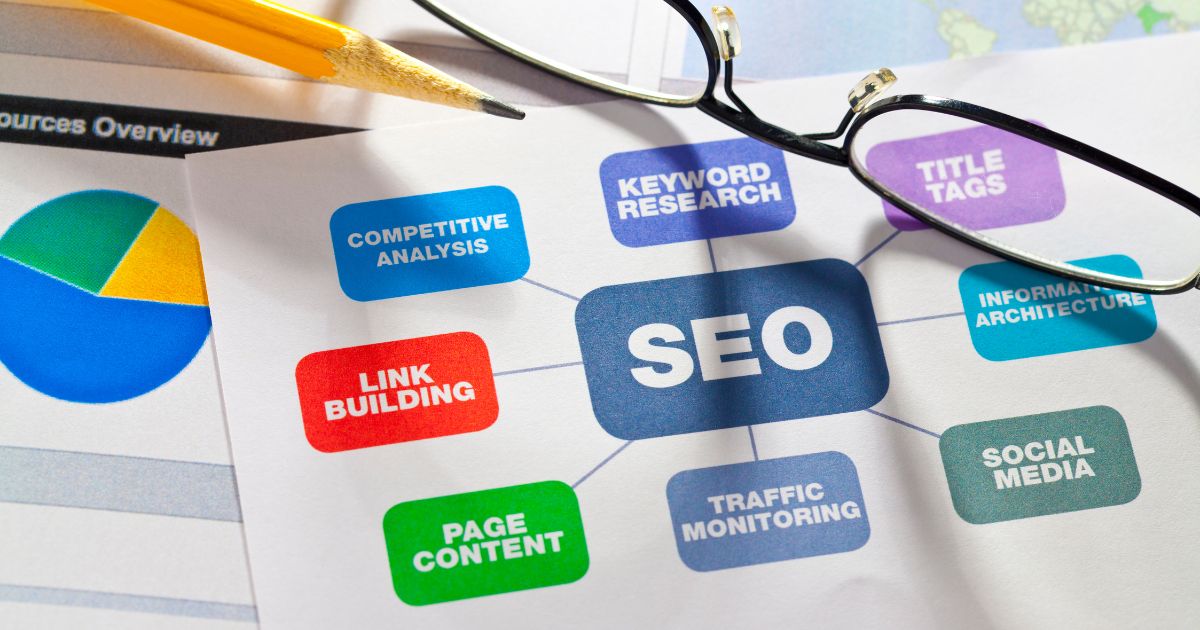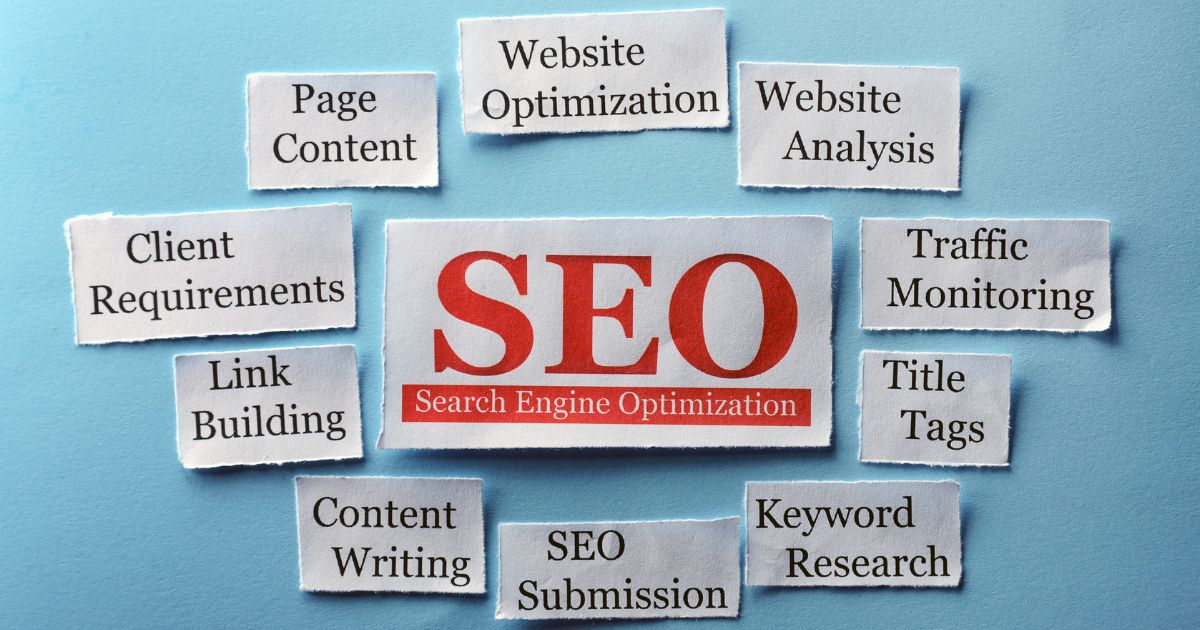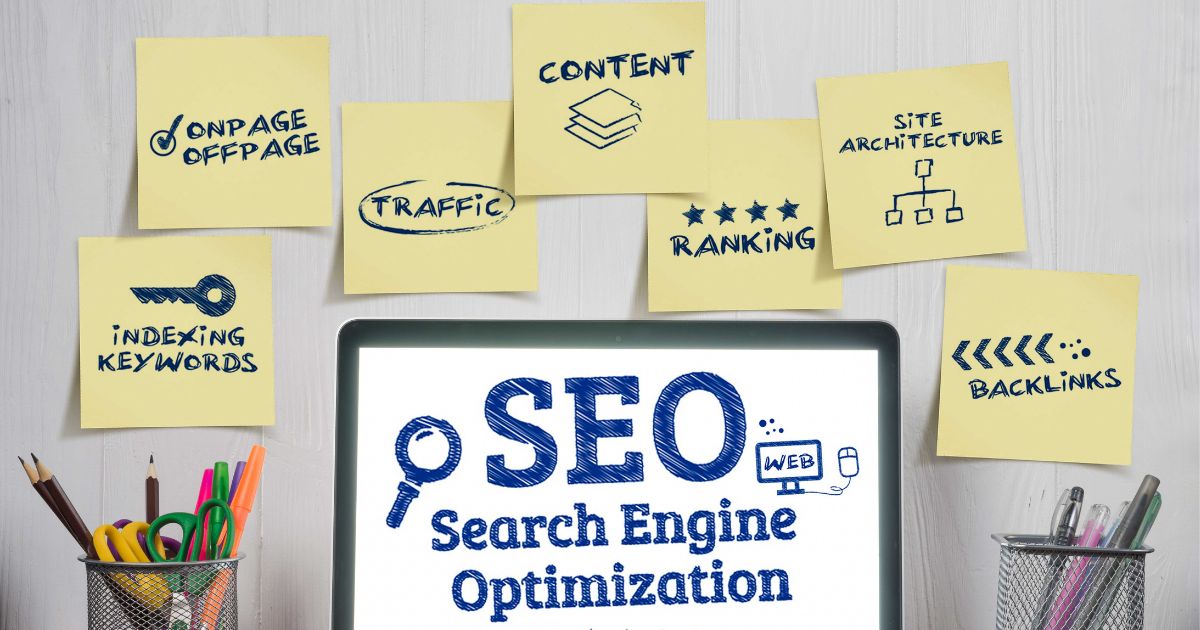
Mastering SEO is a game-changer for businesses aiming to enhance their online presence and attract potential customers.
Two crucial components of a comprehensive SEO strategy are on-page and off-page SEO.
Understanding the differences and how they complement each other can significantly impact your website’s search engine rankings and overall visibility.
Understanding On-Page SEO
On-page SEO, also known as on-site SEO, involves optimizing individual web pages to improve their search engine rankings and attract organic traffic.
This includes optimizing the website’s content and HTML elements to ensure search engines understand the context and relevance of your site.
The primary goal of on-page SEO is to enhance the user experience and provide valuable content that meets search intent.
Start Attracting Customers Through SEO Today!
We can help you attract new customers through Tailored Search Engine Optimization Strategies for Your Business.
Key On-Page SEO Factors
Title Tags and Meta Descriptions
Title tags and meta descriptions play a crucial role in how your content is presented in search engine results pages (SERPs).
The title tag, a critical HTML element, should be concise and include relevant keywords to attract clicks.
Meta descriptions, while not a direct ranking factor, significantly impact click-through rates (CTR) by providing a brief summary of the page content.
Well-crafted title tags and meta descriptions can improve your website’s visibility and entice users to click on your link.
Internal Links and URL Structure
Internal linking is a vital aspect of on-page SEO, aiding both users and search engines in navigating your website.
By linking to other pages within your site, you help search engines understand the structure and hierarchy of your content, which can enhance your search engine rankings.
Additionally, a clean and descriptive URL structure can improve user experience and provide search engines with context about the page’s content.
High-Quality Content and Relevant Keywords
Creating high-quality content that addresses user intent is one of the most important factors for on-page SEO.
Incorporating relevant keywords naturally within your content can help search engines understand the topic and relevance of your pages.
High-quality content not only attracts site visitors but also encourages them to stay longer and engage more, which can positively impact your rankings.
Technical SEO and Schema Markup
Technical SEO addresses the behind-the-scenes elements of your website that impact its functionality and visibility.
Implementing schema markup, a form of structured data, can help search engines better understand your content and improve how your pages are displayed in SERPs.
Technical SEO also involves optimizing your site’s crawlability, indexability, and overall performance.
Page Speed and Mobile Friendliness
Page speed is a critical ranking factor, as slow-loading pages can lead to high bounce rates and poor user experience.
Ensuring your website loads quickly on both desktop and mobile devices is essential for retaining visitors and improving search engine rankings.
Mobile friendliness is equally important, given the increasing number of users accessing websites from mobile devices.
A responsive design that adapts to various screen sizes can enhance user experience and search engine rankings.
Best Practices for On-Page SEO
Optimizing Title Tags, Meta Descriptions, and Page Titles
When crafting title tags, meta descriptions, and page titles, ensure they are concise, informative, and include relevant keywords.
Title tags should be under 60 characters, while meta descriptions should be around 160 characters.
These elements should accurately reflect the content of the page and entice users to click on your link.
Strategies for Internal Linking and Using Image Alt Text
Effective internal linking involves linking to related content within your website to improve navigation and help search engines understand the context of your pages.
Using descriptive anchor text for internal links can provide additional context to both users and search engines.
Additionally, optimizing image alt text with relevant keywords can improve your website’s accessibility and help search engines index your images.
Importance of High-Quality Content and Targeting Relevant Keywords
Creating valuable content that addresses user needs and incorporates relevant keywords is essential for on-page SEO.
Conduct keyword research to identify the terms and phrases your potential customers are searching for, and integrate them naturally within your content.
Focus on providing informative, engaging, and original content that keeps users on your site and encourages them to take action.
Maintaining Good Page Load Speed and Mobile Friendliness
To improve page load speed, optimize images, use a content delivery network (CDN), and minimize HTTP requests.
Consistently evaluate your website’s performance with tools such as Google PageSpeed Insights.
For mobile friendliness, ensure your website is responsive and provides a seamless experience across different devices.
Consistently evaluate your site’s performance on different mobile devices to uncover and resolve any potential issues.
Understanding Off-Page SEO
Off-page SEO, or off-site SEO, refers to the actions taken outside of your own website to impact your rankings within search engine results pages.
These external factors, such as backlinks, social media presence, and online reviews, play a crucial role in enhancing your website’s authority and visibility.
Off-page SEO focuses on building a positive online reputation and attracting high-quality backlinks from authoritative sites.
Key Off-Page SEO Factors
Link Building and High-Quality Backlinks
Building links involves obtaining high-quality backlinks from various external websites.
These backlinks act as endorsements from other sites, signaling to search engines that your content is both valuable and reliable.
Focus on obtaining backlinks from authoritative sites within your industry to boost your website’s domain authority and improve search engine rankings.
Social Media Marketing and Social Signals
Social media platforms are a great way to increase brand awareness and drive traffic to your website.
Engaging with your audience on social media and sharing valuable content can generate social signals, which search engines may consider when ranking your site.
Active social media marketing can also lead to more brand mentions and inbound links.
Online Reviews and Positive Reviews
Online reviews, especially on platforms like Google Business Profile, play a pivotal role in local SEO and building trust with potential customers.
Encourage satisfied customers to leave positive reviews, as these can improve your online reputation and influence search engine rankings.
Managing and responding to reviews, whether positive or negative, demonstrates your commitment to customer satisfaction.
Guest Blogging and Brand Mentions
Creating guest blog posts entails composing and sharing articles on other relevant industry websites.
This strategy can help you reach a wider audience, build relationships with other website owners, and acquire high-quality backlinks.
Brand mentions, whether through guest blogging or other means, can enhance your online presence and signal to search engines that your site is authoritative and relevant.
Press Release and Content Marketing
Press releases are an effective way to gain exposure and attract attention from authoritative sites.
You can generate media coverage and high-quality backlinks by distributing press releases about significant company news or events.
Content marketing, which includes creating and sharing valuable content like blog posts, infographics, and videos, can also help you attract and engage your target audience.
Best Practices for Off-Page SEO
Effective Link Building and Guest Posting Strategies
When building links, focus on quality over quantity.
Seek backlinks from relevant websites with high domain authority.
Guest posting on reputable sites within your industry can help you establish authority and drive traffic to your site.
Always create high-quality, original content for guest posts to ensure they provide value to the host site’s audience.
Leveraging Social Media Platforms for Brand Mentions and Social Signals
Actively engage with your audience on social media platforms to increase brand mentions and social signals.
Post your content regularly, engage with your audience, and join conversations relevant to your industry.
Use social media to build relationships with influencers and encourage them to share your content, which can amplify your reach and attract more inbound links.
Encouraging Positive Reviews and Managing Online Reputation
Encourage satisfied customers to leave positive reviews on platforms like Google Business Profile and Yelp.
Respond to all reviews quickly and courteously, making sure to address any questions or problems that customers have raised.
A positive online reputation can boost your credibility and influence potential customers’ decisions.
Utilizing Press Releases and Content Marketing for a Broader Reach
Distribute press releases to announce significant company news, product launches, or events.
Aim to get coverage from authoritative media outlets to generate high-quality backlinks.
Develop a content marketing strategy that includes creating and sharing valuable content regularly.
This can help you attract and engage your target audience, improving your online presence and search engine rankings.
Integrating On-Page and Off-Page SEO
Importance of a Comprehensive SEO Strategy Combining Both Approaches
For the best results, it’s essential to integrate both on-page and off-page SEO into your digital marketing strategy.
While on-page SEO focuses on optimizing your website’s content and technical aspects, off-page SEO enhances your website’s authority and online reputation.
Together, these strategies can significantly improve your search engine rankings and overall visibility.
How On-Page and Off-Page SEO Work Together for Best Results
On-page SEO focuses on optimizing your website to be search engine friendly while also enhancing the user experience.
Off-page SEO, on the other hand, helps to build your website’s authority and attract high-quality backlinks.
By combining these strategies, you can create a comprehensive SEO approach that addresses all aspects of search engine optimization, from content quality to online reputation.
Examples of How to Effectively Integrate Both Strategies
For example, if you publish a high-quality blog post on your website (on-page SEO),
you can promote it through social media and guest blogging (off-page SEO) to attract more traffic and backlinks.
Similarly, if you receive positive reviews on your Google Business Profile (off-page SEO),
you can highlight these reviews on your website (on-page SEO) to build trust with site visitors.
Final Thoughts
On-page and off-page SEO play a crucial role in improving your search engine rankings and overall online visibility.
Implementing the best practices for both on-page and off-page SEO can create a comprehensive SEO strategy that enhances your website’s performance, attracts more site visitors, and drives business growth.
Remember, a successful SEO strategy requires ongoing effort and adaptation to stay ahead of the competition and meet the evolving needs of your audience.
Actionable Steps
First Steps for Website Owners to Improve Their On-Page and Off-Page SEO
- Conduct a Comprehensive SEO Audit: Assess your current on-page and off-page SEO performance to identify areas for improvement.
- Optimize Your Website’s Content and HTML Elements: Ensure your title tags, meta descriptions, and page titles are optimized with relevant keywords.
- Develop a Content Marketing Strategy: Create and share high-quality content regularly to attract and engage your target audience.
- Implement Effective Link Building Strategies: Focus on acquiring high-quality backlinks from authoritative sites within your industry.
- Engage with Your Audience on Social Media: Build relationships with followers and influencers to increase brand mentions and social signals.
- Encourage and Manage Online Reviews: Ask satisfied customers to leave positive reviews and respond to all reviews promptly and professionally.
Tips for Ongoing SEO Maintenance and Monitoring
- Regularly Update Your Content: Keep your website’s content fresh and relevant by updating it regularly with new information and insights.
- Monitor Your SEO Performance: Use tools like Google Analytics and Google Search Console to track your SEO performance and identify areas for improvement.
- Stay Informed About SEO Trends and Best Practices: Stay up-to-date with the latest SEO trends and best practices to ensure your strategy remains effective.
- Conduct Regular SEO Audits: Periodically review your on-page and off-page SEO efforts to ensure they are aligned with your goals and delivering the desired results.
By following these actionable steps and maintaining a proactive approach to SEO, website owners can improve their website’s visibility, attract more organic traffic, and achieve long-term success in the competitive digital landscape.
Ready to take your SEO strategy to the next level?
At Brimar Online Marketing, we specialize in both on-page and off-page SEO to ensure your website ranks higher, attracts more visitors, and converts potential customers.
Our team of experts in San Francisco is here to help you achieve the best results with a tailored, comprehensive SEO strategy.
Don’t wait!
Enhance your online presence and dominate search engine rankings today.
Contact Brimar Online Marketing now to get started!
Our SEO Services Have Helped Our Clients Increase Their Revenue!
“I highly recommend Brimar if your looking to grow your online business. You will be satisfied with the high level of expertise and high quality of services. It has helped my business grow by leaps and bounds.”
CEO




